Body Diversity – Societal Issues and an alert for Brands

Almost three out of four Canadians (73%) feel comfortable with the idea of being overweight.
Furthermore, our indicator has been trending upward over the past ten years. Tolerance for being overweight has risen significantly over the past decade, from slightly less than two out of three in 2011 (65%) to almost three out of four in 2021 (73%).
Growing tolerance for being overweight
Canada, 2011-2021, Panorama Study
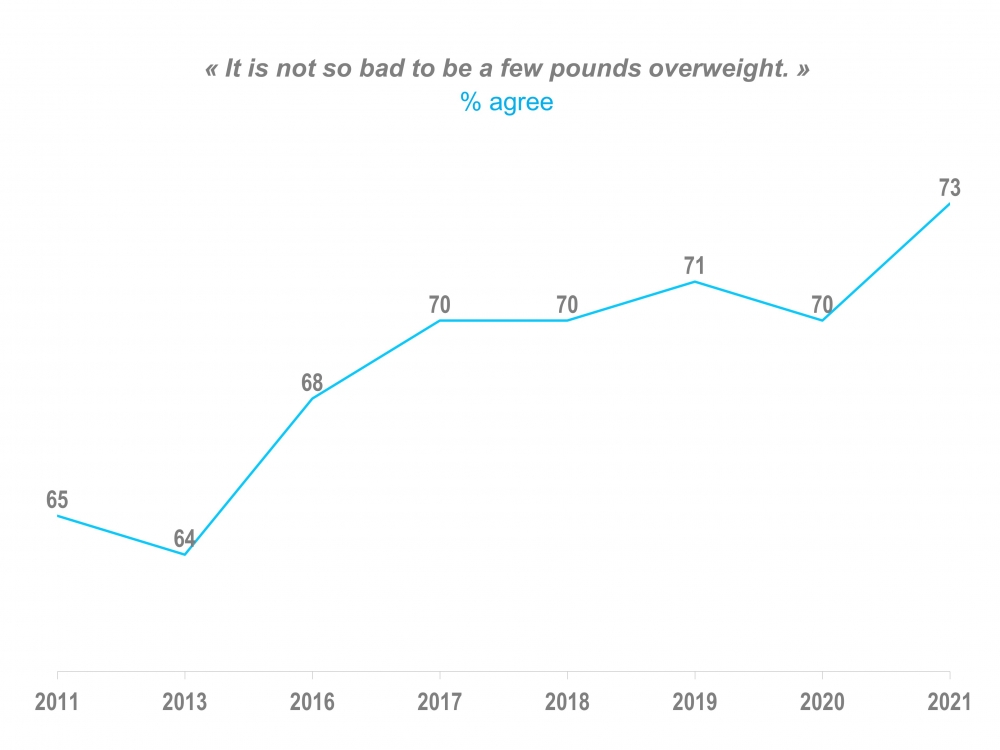
Note, however, that many more Canadians say they “somewhat agree” with the statement (55%) than “totally agree” (18%) with it. This brings some context to the reach of this trend, especially since the statement is already quite nuanced (“a few pounds”). Nevertheless, the almost continuous rise of this indicator of nearly 10 points (+8) over 10 years is still highly significant, regardless of nuance.
Growing tolerance for being overweight
Canada, 2011 and 2021, Panorama Study
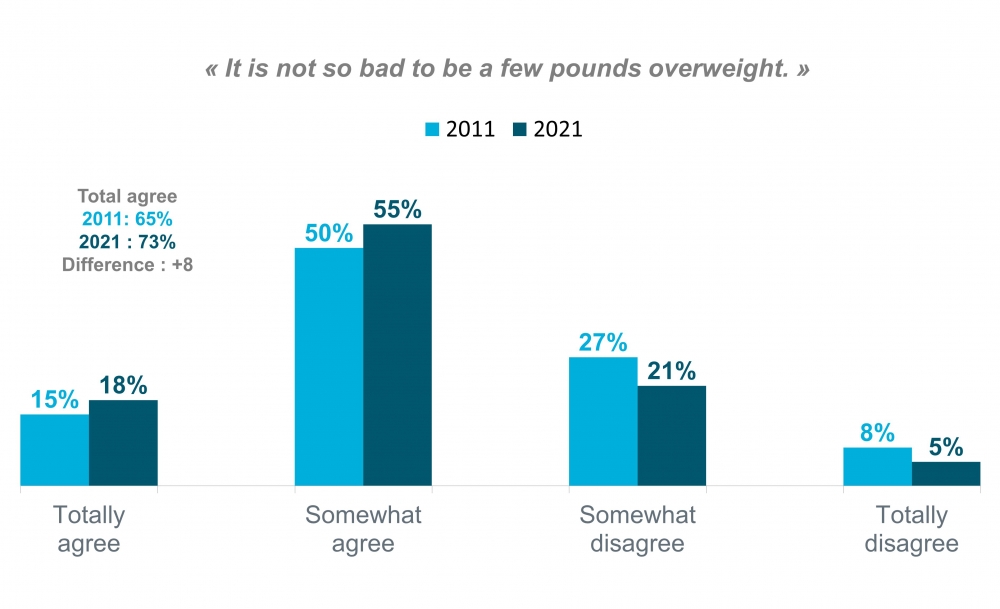
This trend becomes even more significant when we explore how different age groups have reacted to this issue in the last 10 years – age being the only sociodemographic criterion with significant variances.
Two phenomena clearly emerge from the evolution of our indicator: older generations in Quebec are catching up to their English Canadian counterparts and younger younger individuals have been strong on this indicator for almost 10 years.
Catching up and a letting themselves go as they age
In the 55+ age group, the proportion who “somewhat” agree with the statement has risen markedly from 2011 to 2021 – resulting in about a 15-point rise or more for all individuals agreeing with this statement in this age group.
The following two examples make this clear:
Growing tolerance for being overweight
Canada 2011 and 2021, Panorama Study
Among 45-54 year olds in 2011 and 55-64 year olds in 2021 (the same generation)
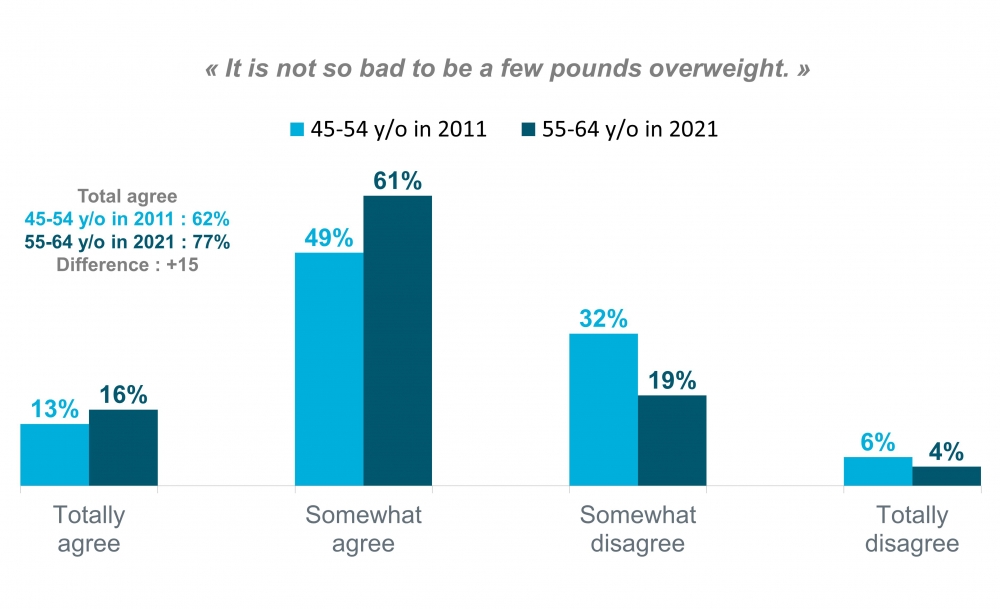
And the same obtains for even older individuals:
Growing tolerance for being overweight
Canada 2011 and 2021, Panorama Study
Among 55 year olds plus in 2011 and 65 year olds plus in 2021 (the same generation)
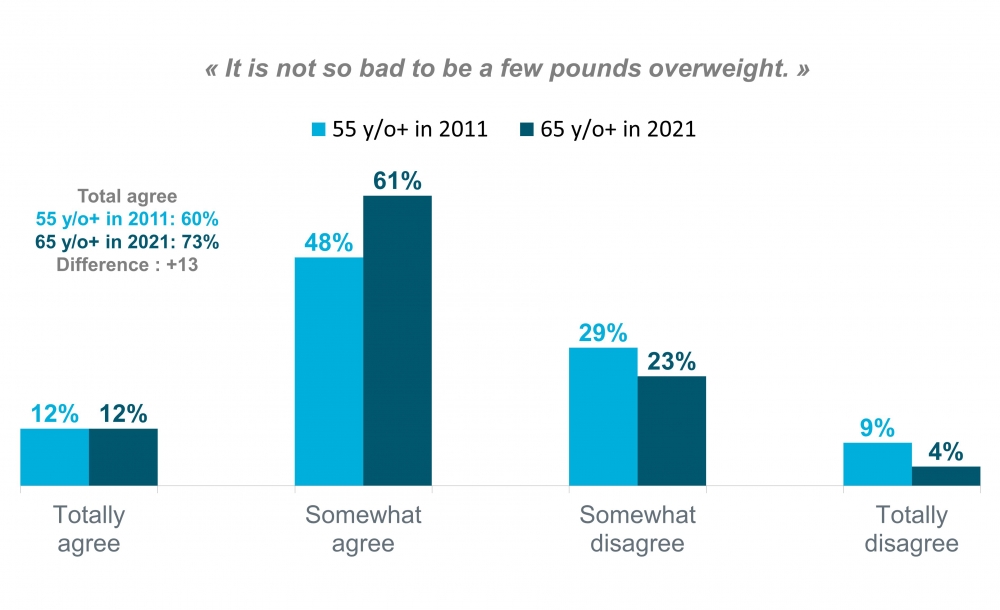
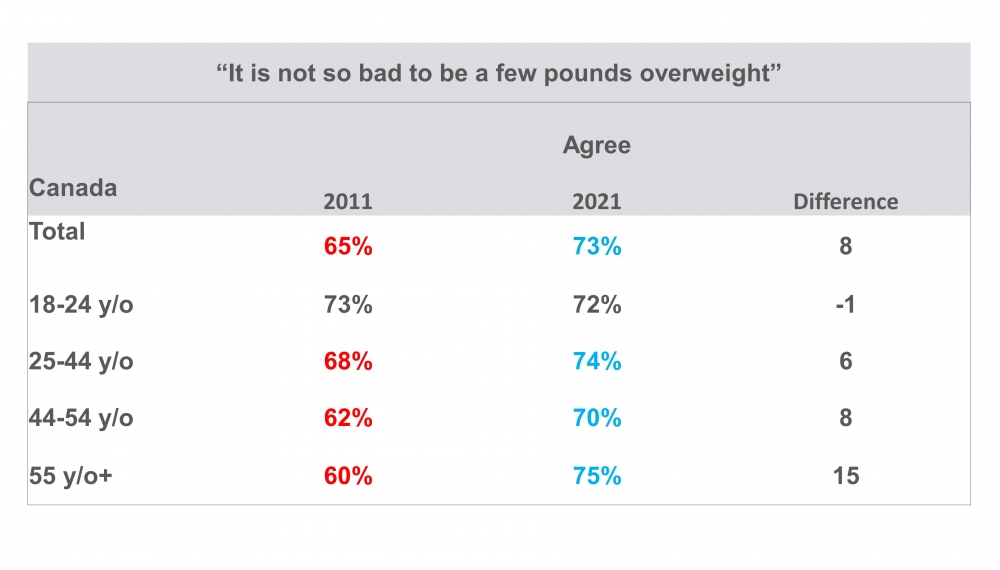
Several factors explain why older generations are catching up to younger age groups and becoming more accepting of being slightly overweight. For the majority of older people, the vanity of a slender body wanes with age. Their priorities and values are elsewhere. Their relationship with their own body, as well as their judgment of the bodies of others, is more authentic and less influenced by the idealized body types promoted in the media. What matters more to people as they age is self-expression and spontaneity.
Being overweight is nevertheless a public health issue. Obesity is associated with several health problems, including diabetes and heart disease. The rising tolerance for weight gain among Canadians is a sign that this issue is being somewhat trivialized, that it has even been given a new legitimacy.
It is true, as we have pointed out earlier, that our statement does not refer to obesity as such but only to a few extra pounds. But still, some of them have probably put on some extra weight and now consider it quite acceptable. This rising tolerance for a bit of extra weight is probably related to, if not caused by, our hedonistic culture of living well without having to expend much effort.
A different trend among younger people
As we said earlier, the older we get, the more tolerant we become about our weight. However, the same does not apply to the younger age groups. They were already very tolerant about this issue 10 years ago. Perhaps they were already very accepting of body diversity! The following graph illustrates this trend particularly well, especially when compared to the previous two graphs.
Growing tolerance for being overweight
Canada 2011 and 2021, Panorama Study
Among 18-24 year olds in 2011 and 28-34 year olds in 2021 (the same generation)
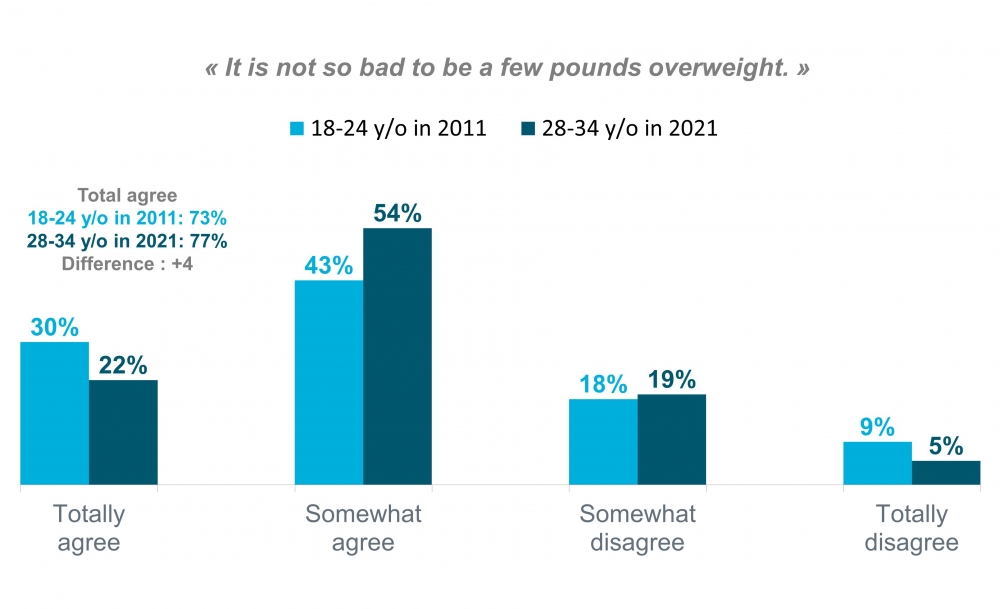
We might even say that this generation has “softened” on this issue over time. While the overall percentage of these young people in agreement with our statement has increased slightly between 2011 and 2021, from 73% to 77%, those who “somewhat agree” rose 11 points while those who “totally agree” fell 8 points.
On the other hand, the attitude of today’s younger generation is very similar to their equivalent cohort 10 years ago (18-24 year olds in 2021 compared to 18-24 year olds in 2011).
Growing tolerance for being overweight
Canada 2011 and 2021, Panorama Study
Among 18-24 year olds in 2011 and 18-24 year olds in 2021 (different generation)
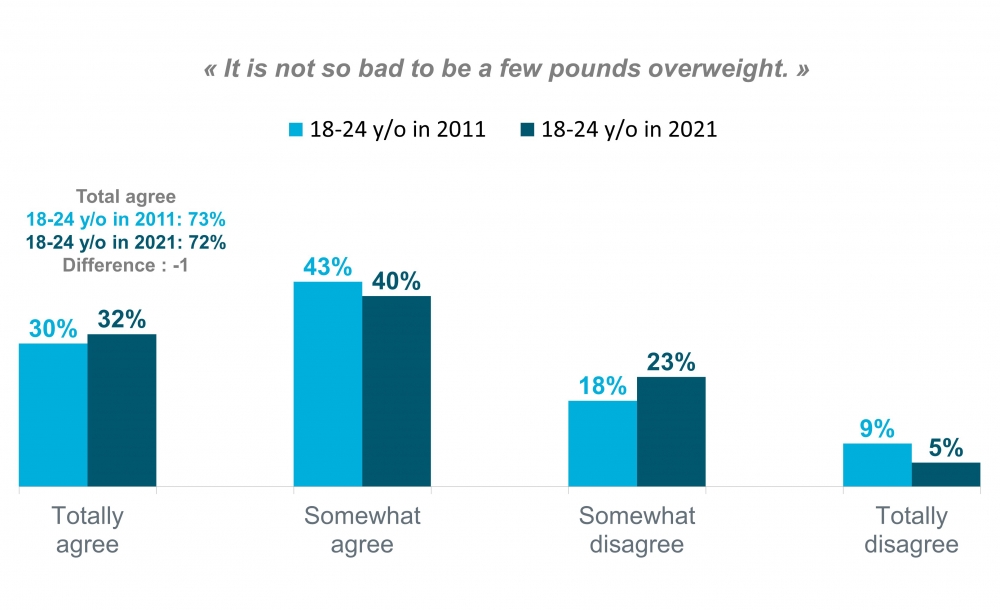
Young people with new values
For 10 years, the youngest cohort has been at the forefront of this new acceptance of being slightly overweight, which has tended to spread gradually throughout society (especially among the elderly).
It is true that this new legitimacy could pose a public health risk. But it is also, especially among today's younger individuals, a sign of a desire for personal expression, respect for the uniqueness of the individual in society, regardless of weight, age, race, sexual orientation or gender.
Crossing the results of our few extra pounds statement with the personal values measured by our Panorama program clearly shows that this is a quest for personal fulfillment and a rejection of the constraints of social norms in favour of respect for all types of diversity: body, ethnic, sexual, etc.
Beyond the health issues, what is most important is happiness – feeling good within oneself, being accepted for who you are and not for how well you conform to media stereotypes.
Fundamentally, it is this quest for fulfillment and respect for social pluralism that accounts for this 10-year rise in the acceptance of a few extra pounds.
Despite the toxic subculture of extreme thinness among young people found on social media (particularly on Instagram), the vast majority do not subscribe to this mindset and opt instead for self-expression and displays of uniqueness.
Quebec is catching up to English Canada
One of Quebec’s most “distinct” sociocultural differences in the past is in the process of evaporating! Quebecers’ preoccupation with bella figura is gradually disappearing. In the past, being slightly overweight was not quite acceptable to francophone Quebecers, whose appearance in the eyes of others used to be of great concern. But with the aging of the Quebec population, the desire for authentic personal expression has grown. The result: Quebecers have almost caught up to their English Canadian counterparts in their acceptance of being slightly overweight.
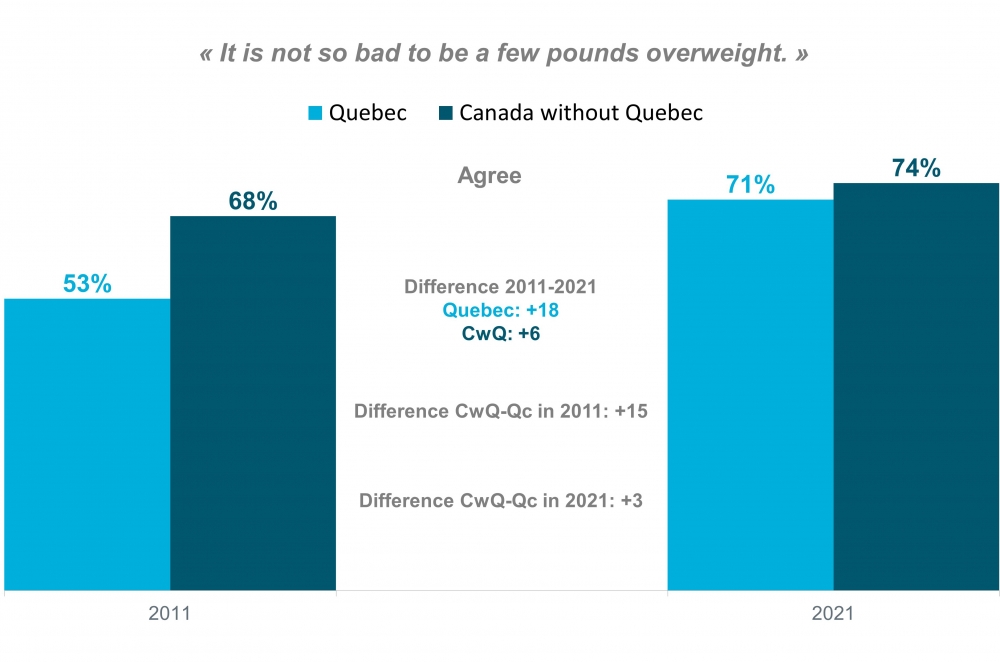
An alert and an opportunity for brands
This drive for personal expression is unabated despite strong pressure from the media, advertisers and brands who bombard the public daily with aspirational body images that diverge sharply from the norm!
The media, advertisers and brands continue to promote the illusion of the “perfect” body (although it is probably fair to say that, consciously or not, the public still has an appetite for it due to cultural conditioning). However, they risk being accused one day of poisoning the lives of consumers, especially the young, with their unattainable physical role models.
The opportunity here is for brands to be more in tune with people’s desire for authenticity, to promote greater body diversity when casting actors and models for their visual communications. To show that they are inclusive, regardless of people’s differences or uniqueness (provided of course that the offer is relevant to them).
However, if a brand still mainly reaches customers who appreciate aspirational images of slender men and women, the transition to authenticity can wait, even though the marketplace and society are heading in the opposite direction – a trend that will probably catch up with the brand one day in any case.
As always, knowing your target markets well is the key to producing content that connects with and is relevant to their values
.